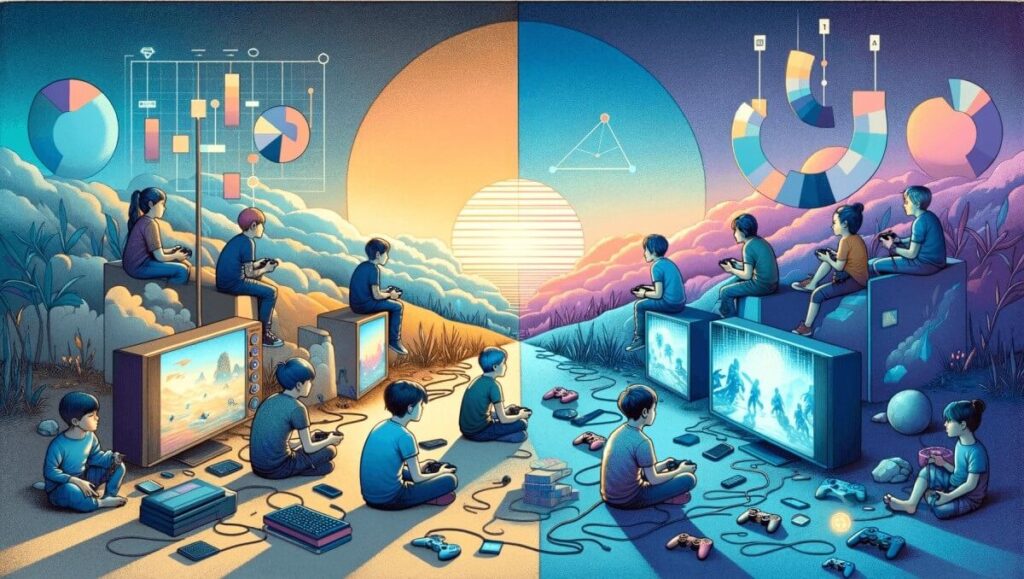“I used to play games for 14 hours straight. Now I build real-world adventures.” Meet Jack Chen, former gaming addict turned outdoor expedition leader. His story, along with others, reveals a powerful truth: breaking free from digital addiction isn’t about giving up technology – it’s about reclaiming your life.
The Reality of Gaming Addiction
“I lost three years of my life to gaming,” Jack shares. “But what’s interesting is that I was chasing something real: achievement, community, purpose. I just found it in the wrong place.”
Gaming Addiction Success Story #1: The Achievement Hunter
Jack’s Journey
- Then: 98 hours weekly gaming time
- Now: Leads wilderness expeditions
- Transformation time: 18 months
- Key insight: “I needed real-world quests”
Jack’s turning point came when he realized he could channel his love for achievement into physical challenges. “Each mountain I climb gives me the same rush as leveling up – but now I have actual photos to share, not just screenshots.”
Gaming Addiction Success Story #2: The Social Gamer
Maria’s Transformation
- Then: Social anxiety, gaming as escape
- Now: Local gaming community organizer
- Key change: Virtual connections to real ones
- Breakthrough moment: Starting a local board game café
“I didn’t need to quit gaming entirely,” Maria explains. “I needed to bring gaming into the real world. Now I host weekly board game nights. The face-to-face connections are incredible.”
Gaming Addiction Success Story #3: The Competitive Player
David’s Evolution
- Then: Professional esports aspirations
- Now: Youth sports coach
- Transformation catalyst: Physical health issues
- Current mission: Teaching team skills through sports
“I still game occasionally,” David shares, “but now it’s just one part of my life, not my entire identity.”
The Science of Transformation
Research shows successful gaming addiction recovery involves:
- Dopamine replacement activities
- Social support systems
- Identity reconstruction
- Skill transfer to real-world activities
Common Transformation Patterns
Phase 1: Recognition
- Acknowledging the problem
- Understanding personal triggers
- Identifying unmet needs
- Accepting the need for change
Phase 2: Redirection
- Finding real-world alternatives
- Building new routines
- Developing offline skills
- Creating support networks
Phase 3: Reinvention
- Establishing new identity
- Transferring gaming skills
- Building lasting habits
- Maintaining balance
Gaming Addiction Success Story #4: The Strategy Gamer
Sarah’s Redirection
- Then: 60+ hours weekly in strategy games
- Now: Small business owner
- Transfer: Strategic thinking to real business
- Result: Successful local café
“Those years weren’t wasted,” Sarah reflects. “Every resource management game taught me something about running my business.”
Practical Steps for Transformation
1. Skill Translation
- Map gaming skills to real activities
- Find physical world equivalents
- Build on existing interests
- Create achievement systems
2. Social Reconstruction
- Join local interest groups
- Find offline gaming communities
- Build new friendships
- Create support networks
3. Identity Development
- Explore new hobbies
- Set real-world goals
- Document progress
- Celebrate achievements
The Role of Mindful Technology
Successful transformers often report:
- Using gaming skills in productive ways
- Setting healthy gaming boundaries
- Finding balance with technology
- Creating structured tech time
Gaming Addiction Success Story #5: The Mobile Gamer
Lisa’s Journey
- Then: Constant mobile gaming
- Now: Amateur photographer
- Key shift: From virtual to real exploration
- Result: Growing Instagram following
“I still get to collect things,” Lisa laughs, “but now it’s beautiful moments instead of virtual items.”
Supporting the Journey
For Friends and Family
- Understand the transition process
- Offer non-judgmental support
- Participate in new activities
- Celebrate small wins
For Those in Transition
- Be patient with the process
- Focus on progress, not perfection
- Build gradual changes
- Maintain connections







